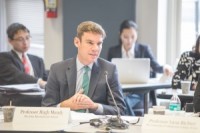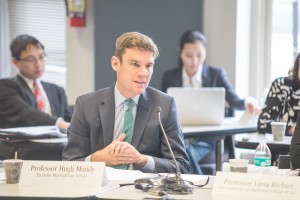
As published in Reuters

Professor Hugh Mundy addresses the Advisory Committee on the Rules of Evidence Oct. 9, on proposed changes to the hearsay rule.
How lawyers and courts deal with hearsay evidence could change in the near future, after proposed changes were discussed at The John Marshall Law School in Chicago. John Marshall hosted the annual fall meeting of the Advisory Committee on the Rules of Evidence for the U.S. federal courts.
During their meeting at John Marshall, federal judges as well as law professors and practicing attorneys from around the country debated the merits and weaknesses of current federal rules governing the use of hearsay evidence in cases. Any proposed changes stemming from the meeting at John Marshall will be submitted to the U.S. Supreme Court for approval.
The meeting focused on concerns raised by Judge Richard Posner of the U.S. Court of Appeals for the Seventh Circuit in that court’s ruling in U.S. v. Darnell Boyce. In that case, Posner raised concerns with certain exceptions to the federal hearsay rule. Posner echoed those same concerns during the meeting held at John Marshall, calling into question the need for hearsay rules and their exceptions. He proposed, instead that juries and judges rely on “common sense” in deciding the merit of pieces of evidence.
The Advisory Committee heard expert opinions on the rules governing evidence admissibility. As a former federal public defender John Marshall Professor Hugh Mundy – who teaches Criminal Law and Evidence – shared his expertise on whether witness statements could be used, even if they’re inconsistent with statements that witness gives during a trial.
Proposed federal rule changes are submitted by the Advisory Committee to the Federal Judicial Conference and are considered at the Conference’s fall session each year. If the Conference approves the proposal, it is submitted to the U.S. Supreme Court. If the Supreme Court approves the proposal, it must submit the proposal to Congress by May 1, of the year in which the rule is to take effect. Congress has until December 1, of that year to act upon the rule. If Congress takes no action the rule automatically goes into effect.
The Advisory Committee’s proceedings at John Marshall will be published in an upcoming issue of the Fordham Law Review.
